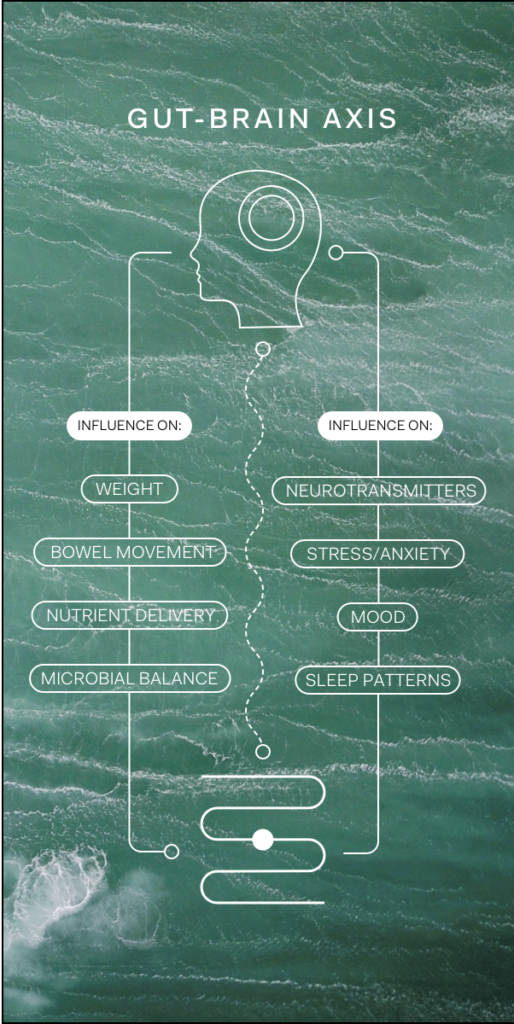| I get so, so many questions about gut health I wanted to devote a post to it today. When our gastrointestinal tract is disregulated, it can have a profound impact on our health. Oftentimes when I see clients and assess their concerns I tell them they don’t have a health issue, they have a gut issue. |
Digestive symptoms and the correlation with disease
| Let’s get into it… Our gut is a highly sensitive organ and many of today’s common insults to it can cause dysregulation or imbalances, wreaking havoc on our health. Our gut has an incredibly complex relationship with so many other parts of our body, it produces large amounts of our neurotransmitters, which are responsible for communicating feelings in our body. It also produces a large amount of the tissue that makes up our immune system. It contains 10 times more cells than the rest of our body combined. The GI tract also incredibly high metabolic activity compared to other organs. With all of this in mind it’s easy to see how problems in the gut can influence so many other areas of our body. A large portion of Americans have digestive related symptoms and diseases. |
Intestinal permeability
You may have heard the term “intestinal permeability”. Our gut is made of cells that are held together by “junctions”. In a healthy gut, small molecules should be able to pass and be absorbed. However, larger membranes should not be able to get through. When junctions between the cell become damage, this allows larger molecule to pass. Damage to the cell junctions come from many different things; poor diet, food allergies and sensitivities, certain drugs including anti-inflammatory medications, toxins, improper nutrients, stress, infections, etc. When larger molecules cross the intestinal membrane, they initiate an immune response. This plays a role in initiating the inflammatory response. This can be diagnosed as leaky gut, or more and more we are seeing SIBO- small intestine bacterial overgrowth.
what is the microbiome anyway…
| Our gut is host to hundreds of different bacteria, called our microbiome. These bacteria in our microbiome help us digest our food, regulate our immune system, and protect against other disease-causing bacteria, and produce essential vitamins. What we eat influences the population and metabolic activity of our microbiome. The composition of our microbiome can shape a healthy immune response or cause us to be predisposed to disease. |
Food intolerance vs allergies
Food reactions are often overlooked when considering health conditions. An allergy is classified by severe symptoms immediately after a trigger food is eaten. Allergies can be triggered by even tiny amounts of food exposure. Many foods can be associated with allergies some of the top ones include dairy, eggs, peanuts, wheat, soy, fish, shellfish, and tree nuts. Food sensitivities are characterized by a more delayed response occurring over hours or days. This usually causes in imbalance in the GI tract that affects the immune system. Due to the delayed response for onset of symptoms, it can be difficult to pinpoint which food is causing the reaction. The severity of the symptoms can also be dependent on the amount of the food eaten. Symptoms of sensitivities also are a wide array, they can include congestion, fatigue, sneezing, migraines, nausea, eye watering, itchy skin, and cramps just to name a few. Food intolerances are reactions to a specific for chemical such as lactose, histamine, MSG, for examples. This results when a person lacks the enzyme or nutrient responsible for metabolizing (or breaking down) that chemical. Determining what type of food reactions you may have plays a big role in balancing your GI tract and alleviating many uncomfortable symptoms.
In practical terms – and the second brain
If you’ve ever felt sick with nerves, or made a decision on feeling, you’re familiar with “gut instinct”. Your gut is hardwired to the brain which is whit is called the second brain. Your gut health and mental health are directly connected, so if you’ve been feeling a little off, taking care of your gut and be a great place to start.

A healthy gut is the backbone to all health – from immunity to skin, digestion to energy. Supporting the trillions of bacteria you carry in your body is the first step to a healthy and diverse microbiome.
Happy Hormones
Up to 75% of serotonin and 50% of dopamine, the happy hormones, are made in the gut. Bacteria to keep the rest of the micro biomes WellFed so you can function and field good from the inside out.
SKIN There is also a strong link between the health and diversity of your gut and your skin, it is known as the gut-skin connection.
IMMUNITY Your gut microbiome has been proven to have a profound effect on the health of the entire body – from brain function, weight, skin, immunity, digestion and mood. When you consider that up to 80% of our immune system “lives” in the gut and up to 75% of our serotonin is produced there – it makes sense.
In short, everything starts with a healthy gut.
I hope this gave you a primer into your gut health and overall health. I always recommend starting with an elimination diet to see if we can resolve your food issues by taking away triggers and adding in good things (like probiotic rich foods, prebiotics and other gut-loving foods).






No Comments